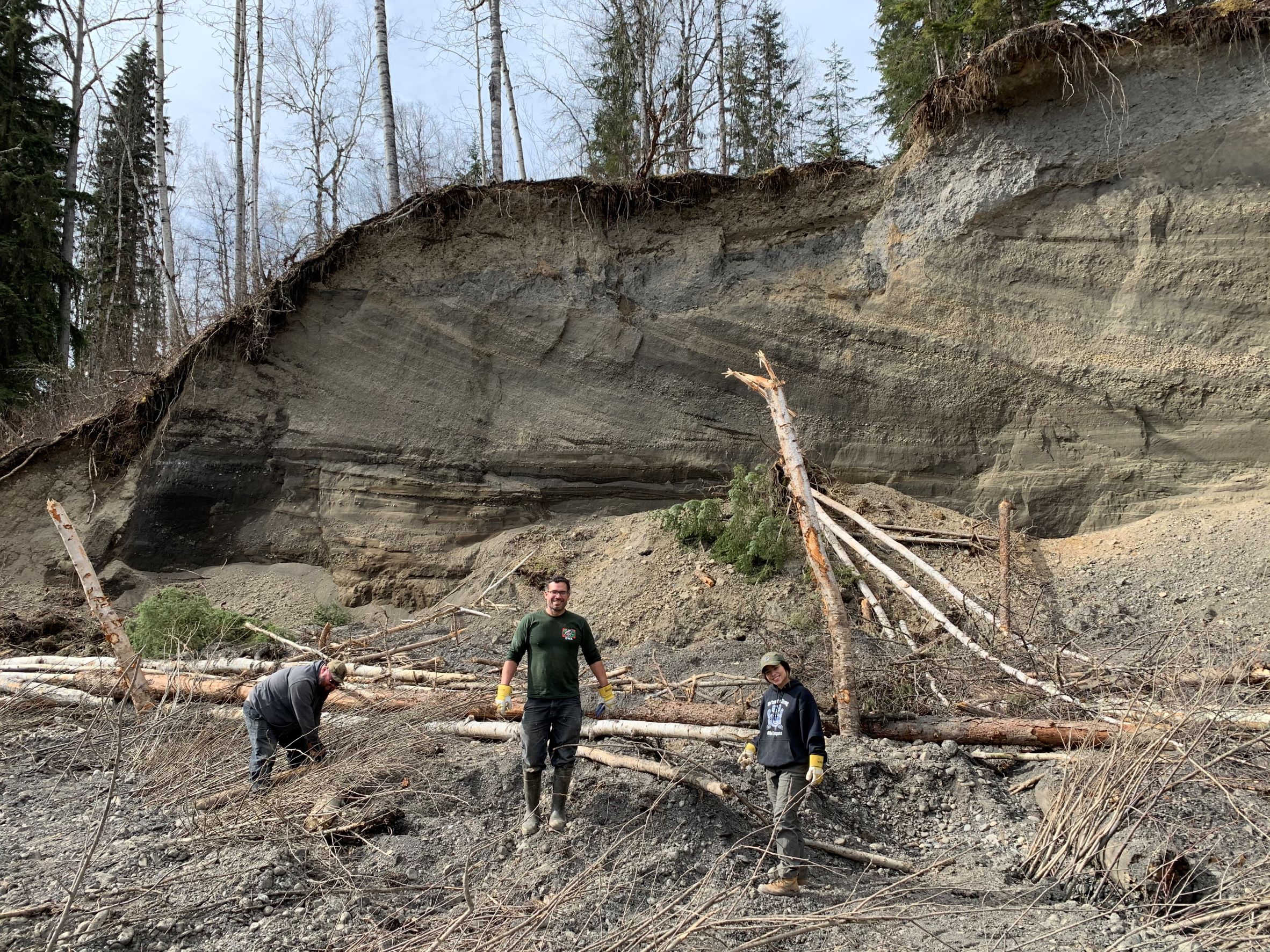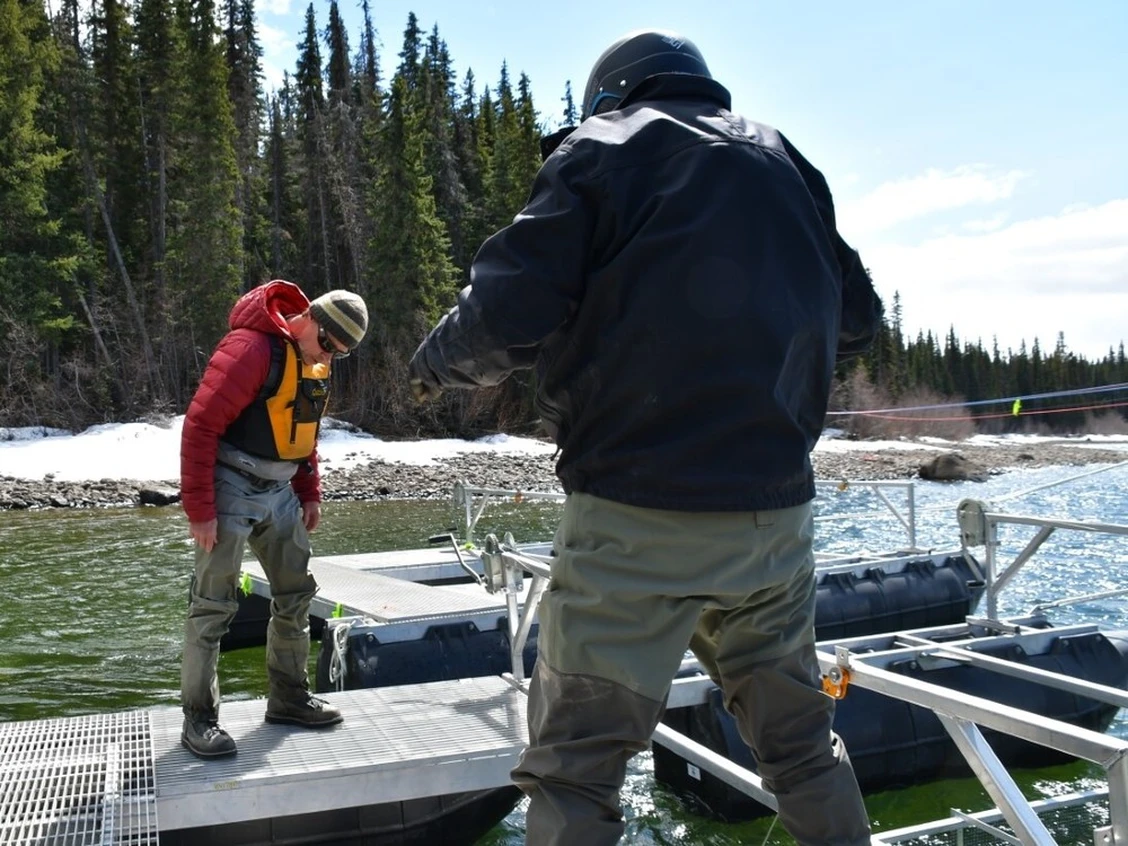

The Gitksan Watershed Authorities are working to restore McCully Creek. The team is pictured planting native species to help strengthen the eroding bank. Photo: Taylor Wale/Gitksan Watershed Authorities
We Need to Bring Back Reverence for Water
Crews with the Healthy Watershed Initiative worked through record heat, heavy rain and flooding — events that demonstrated the climate crisis is a water crisis
By Mark Gifford and Tara Marsden
The Healthy Watersheds Initiative (HWI) has just released its major outcomes’ report on one of the most significant investments in watershed security made by the B.C. government in decades.
Over the past 24 months, more than 60 projects — spanning thousands of sites within B.C.’s eight major drainage basins — restored riparian and wetland habitats, created spawning grounds for salmon, and improved biodiversity and community resiliency to withstand climate change events. In addition, the funding boosted the watershed sector, providing training and job opportunities for over 1,200 youth, women and Indigenous people hit hardest by COVID-19 job losses.
HWI crews worked through record heat and drought, raging wildfires, heavy rain and destructive flooding. These events demonstrated that the climate crisis is a water crisis impacting ecosystems, economies, lives and livelihoods. Many HWI project sites showed increased resilience to climate change after work was done to restore their natural functions. For example, during the catastrophic flooding of the Fraser Valley in November 2021, salmon escaped the Vedder River’s high-velocity flow, finding refuge in the restored off-channels of Peach Creek.
Impacts to watersheds from development, resource activity and diking can negatively affect fish and wildlife habitats and water flows. To reverse this trend, HWI supported the restoration of rivers, streams and wetlands to more natural states that fish can move easily through. Upgrading infrastructure, such as installing a new fish-friendly floodgate on Agassiz Slough and removing obsolete dams near Trail, has helped bring back salmon and endangered Western toads. HWI projects also supported farmers and ranchers in reducing soil loss from erosion. Landowners could enhance wetland areas on their properties to hold water and better adapt to drought and flood conditions using natural, low-tech methods to restore the resiliency of stream banks and wetlands.
More monitoring is needed to understand and adapt to changes on the land due to global warming. Just north of the Village of Kispoix, Gitksan community members learned monitoring and evaluation techniques while restoring salmon passage and habitat use on McCully Creek. As the Gitksan and Wet’suwet’en Peoples look back on progress made in the 25 years since the historic Delgamuukw decision, Indigenous-led monitoring, planning and collaboration in their territories stand out as an excellent example of the way forward. Ensuring these two Nations can actively steward their watersheds has breathed life into the UN Declaration on the Rights of Indigenous Peoples’ (UNDRIP) commitments. HWI was a unique funding process, with Indigenous guidance embedded throughout all projects. The initiative collected data on Indigenous engagement, collaboration and knowledge, which was analyzed and referenced explicitly in work plans. In addition, decolonizing workshops were delivered to project participants to assist everyone in understanding the impacts of colonialism on the First Nations who hosted restoration work.

HWI’s commitment to advancing UNDRIP included analyzing articles key to watershed work and making recommendations and principles for future development. The Indigenous Leaders Advisory Circle (ILAC) led a focused discussion among Indigenous experts and advised HWI, project teams and the provincial government. We have learned that recognizing a spiritual connection to water is a way to reset how we have treated the essence of all life. Indigenous Peoples working with settlers to heal damaged watersheds has helped to repair the resiliency of fresh water systems and community relationships. Understanding the history of each unique watershed, and working together to bring it back to the way it was before, is a process that better respects water as a living entity.
The provincial government has committed to creating a watershed security strategy and fund, which could continue the significant groundwork our team and ILAC have begun. After two years of a pandemic, droughts, flooding, wildfires, economic uncertainty, and legacies of colonialism and residential school traumas, HWI project outcomes point to the central role of water in community health and safety, and the necessity of improving watershed sustainability. We need to stop taking life-giving gifts for granted and bring back reverence for water. As the demand for watershed solutions increases, we can embrace and advance intergenerational learning between youth and elders, focusing on mentorship and long-term stewardship of watersheds.
HWI has demonstrated the value of commitments to protecting fresh water and sharing leadership between Indigenous and non-Indigenous communities. However, we must maintain sight of the urgency and central role of watershed security funding across all ministries’ mandates, particularly those addressing climate, UNDRIP, jobs, health, food security, salmon, biodiversity and economic future.
Mark Gifford is CEO of the Real Estate Foundation of BC, which administered the Healthy Watershed Initiative alongside the BC government and Watersheds BC. Tara Marsden of the Gitanyow (Gitksan) people was the senior Indigenous adviser to the HWI and is currently the UNDRIP Fellow with REFBC.
This op-ed originally appeared in the Province on December 17, 2022.
SHARE